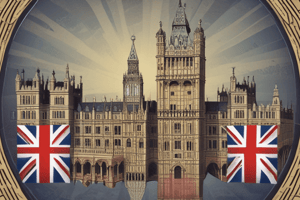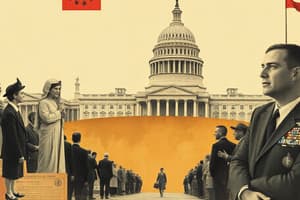Podcast
Questions and Answers
What is cession primarily characterized by?
What is cession primarily characterized by?
- The sudden creation of an island.
- The exchange of territory, gift, or donation. (correct)
- The reclamation of land from rivers.
- The annexation of territory by conquest.
Which term describes the process of acquiring territory through force?
Which term describes the process of acquiring territory through force?
- Reclamation
- Cession
- Conquest (correct)
- Accretion
What is the term for the gradual attainment of sovereignty over new land due to natural forces?
What is the term for the gradual attainment of sovereignty over new land due to natural forces?
- Conquest
- Reclamation
- Avulsion
- Accretion (correct)
How is 'avulsion' defined in the context of land acquisition?
How is 'avulsion' defined in the context of land acquisition?
Which factor does NOT affect state power according to the provided content?
Which factor does NOT affect state power according to the provided content?
What distinguishes Economic/Fiscal Conservatives from Economic/Fiscal Liberals?
What distinguishes Economic/Fiscal Conservatives from Economic/Fiscal Liberals?
When did classical liberalism begin, and who is its founder?
When did classical liberalism begin, and who is its founder?
What is the primary focus of an ideology?
What is the primary focus of an ideology?
What does sovereignty represent in the context of a state?
What does sovereignty represent in the context of a state?
Which theory suggests that the state was formed through divine creation?
Which theory suggests that the state was formed through divine creation?
How does a state differ from a nation?
How does a state differ from a nation?
What is the right of independence for a state?
What is the right of independence for a state?
In which theory do individuals enter into a voluntary agreement to establish a government?
In which theory do individuals enter into a voluntary agreement to establish a government?
Which statement best describes the relationship between a state and government?
Which statement best describes the relationship between a state and government?
What does the right of existence and self-defense allow a state to do?
What does the right of existence and self-defense allow a state to do?
Which of the following is NOT a distinguishing feature between a state and a nation?
Which of the following is NOT a distinguishing feature between a state and a nation?
What is the central thesis of The Wealth of Nations regarding capital?
What is the central thesis of The Wealth of Nations regarding capital?
What does the principle of the 'invisible hand' suggest?
What does the principle of the 'invisible hand' suggest?
How did modern liberalism differ from classical liberalism?
How did modern liberalism differ from classical liberalism?
What was a significant criticism of the laissez-faire system?
What was a significant criticism of the laissez-faire system?
According to Thomas Hill Green, what is a key issue with contracts in a free society?
According to Thomas Hill Green, what is a key issue with contracts in a free society?
What did classical conservatism emphasize regarding societal change?
What did classical conservatism emphasize regarding societal change?
How did Edmund Burke view human rationality?
How did Edmund Burke view human rationality?
In Leviathan, what did Thomas Hobbes argue about man's natural state?
In Leviathan, what did Thomas Hobbes argue about man's natural state?
What argument did Hobbes make regarding government and man's nature?
What argument did Hobbes make regarding government and man's nature?
Who is known as the 'Father of modern socialism'?
Who is known as the 'Father of modern socialism'?
What did Milton Friedman argue about the free market?
What did Milton Friedman argue about the free market?
Which statement reflects a core belief of Marxism?
Which statement reflects a core belief of Marxism?
What was a significant contribution of Louis Blanc in the context of socialism?
What was a significant contribution of Louis Blanc in the context of socialism?
What is a characteristic of modern conservatism according to the content?
What is a characteristic of modern conservatism according to the content?
Which philosopher's ideas influenced Marx's concept of dialectic materialism?
Which philosopher's ideas influenced Marx's concept of dialectic materialism?
What do proponents of conservatism believe regarding the marketplace?
What do proponents of conservatism believe regarding the marketplace?
What is the main feature of modern industrial capitalism according to Marxist theory?
What is the main feature of modern industrial capitalism according to Marxist theory?
Which ideology advocates violent mass action as necessary for radical change?
Which ideology advocates violent mass action as necessary for radical change?
What is the role of a welfare state in the context of social democracies?
What is the role of a welfare state in the context of social democracies?
Which ideology emphasizes the ability of people to establish communities without a state apparatus?
Which ideology emphasizes the ability of people to establish communities without a state apparatus?
How is fascism characterized in terms of governance and society?
How is fascism characterized in terms of governance and society?
Which statement best defines nationalism as described?
Which statement best defines nationalism as described?
What did Mikhail Bakunin and Peter Kropotkin argue regarding the state?
What did Mikhail Bakunin and Peter Kropotkin argue regarding the state?
What was a distinctive feature of Hitler's fascism?
What was a distinctive feature of Hitler's fascism?
Flashcards are hidden until you start studying
Study Notes
Government and Sovereignty
- Government enforces the will of the state.
- Sovereignty refers to the supreme power that governs an independent state, covering internal (within territory) and external (not controlled by others) aspects.
Theories on the Origin of States
- Divine Right Theory: States are divinely created, rulers ordained by God.
- Force or Necessity Theory: States arise from a strong warrior imposing will for protection.
- Paternalistic Theory: States develop from the enlargement of familial structures.
- Social Contract Theory: States formed through a voluntary agreement among people for governance.
State vs. Nation
- A state is a political entity; a nation is based on ethnicity.
- States require people to exist; nations can exist without a state.
- Nations can span multiple states; states may comprise several nations (e.g., Arabs as a national group across various states).
- States cannot be externally controlled; nations can be subject to external forces.
State vs. Government
- Often used interchangeably; government actions are viewed as acts of the state.
- A state needs a government, but a government can exist without a specific state.
- A state's essence remains despite changes in government form.
Rights of State
- Right of Existence and Self-Defense: States can use force to defend against aggressors.
- Right of Independence: States have the right to operate free from external control.
Territory Acquisition
- Cession: Transfer of territory by agreement.
- Conquest: Historically involved annexing territory through force; now largely rejected by international law.
- Accretion: Gaining land through gradual natural processes (e.g., riverbed movements).
- Reclamation: Creating new land from bodies of water.
Factors Affecting State Power
- Area and location.
- Climate and natural resources.
- Size and quality of the population.
- Historical events.
- Institutions and policies.
- International alliances and military strength.
Ideologies
- Definition: A consistent belief system aimed at improving society.
- Economic/Fiscal Liberals support government intervention for economic security; Conservatives oppose it.
- Social Conservatives and Liberals take opposing views on government roles in social matters.
Classical Liberalism
- Originated in 1776 with Adam Smith's "The Wealth of Nations", advocating non-interference in the market.
- Introduced the "invisible hand" principle for economic functioning.
- Evolution into modern conservatism and modern liberalism in the late 19th century.
Modern Liberalism
- Emerged as a response to market deficiencies and social inequities.
- Advocates for government intervention to ensure fair competition and protect the less advantaged.
Classical Conservatism
- Emphasizes gradual change and conservation of historical practices.
- Edmund Burke argued for tradition as a means to address human irrationality.
Socialism and Communism
- François-Noel Babeuf is regarded as the father of modern socialism; he advocated for economic equality.
- Karl Marx and Friedrich Engels proposed class conflict as the path to societal transformation, asserting all history is rooted in class struggle.
- Marxists criticize capitalism for creating antagonistic class relations.
Social Democracy
- Articulated by Eduard Bernstein, emphasizing gradual reform over revolution.
- Nationalization refers to converting private ownership into public control, forming part of the welfare state framework.
Anarchism
- Mikhail Bakunin and Peter Kropotkin viewed the state as an obstacle to freedom and emphasized revolution for change.
- Anarcho-syndicalism prioritizes trade unions and civil disobedience.
Nationalism and Fascism
- Nationalism denotes intense loyalty to one’s country but lacks focus on specific socio-economic issues.
- Fascism is characterized by extreme nationalism, dictatorial power, suppression of opposition, and societal regimentation.
- Adolf Hitler utilized fascist ideology to promote German racial superiority.
Studying That Suits You
Use AI to generate personalized quizzes and flashcards to suit your learning preferences.




